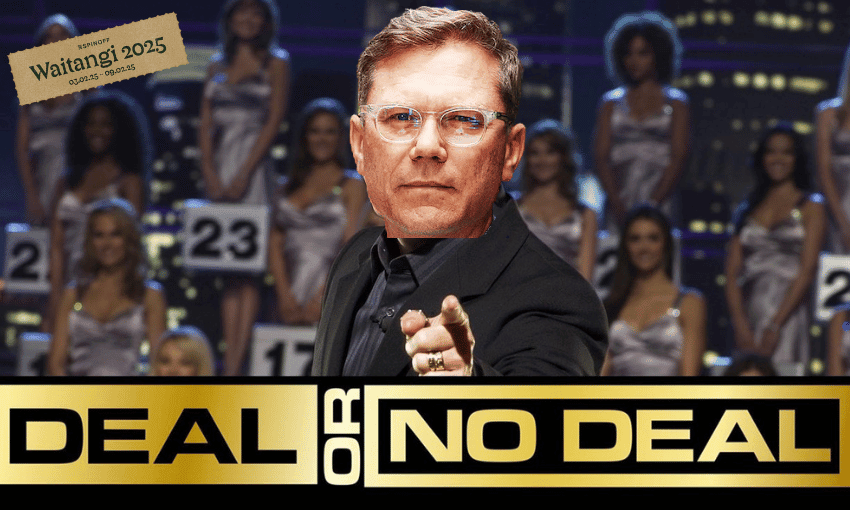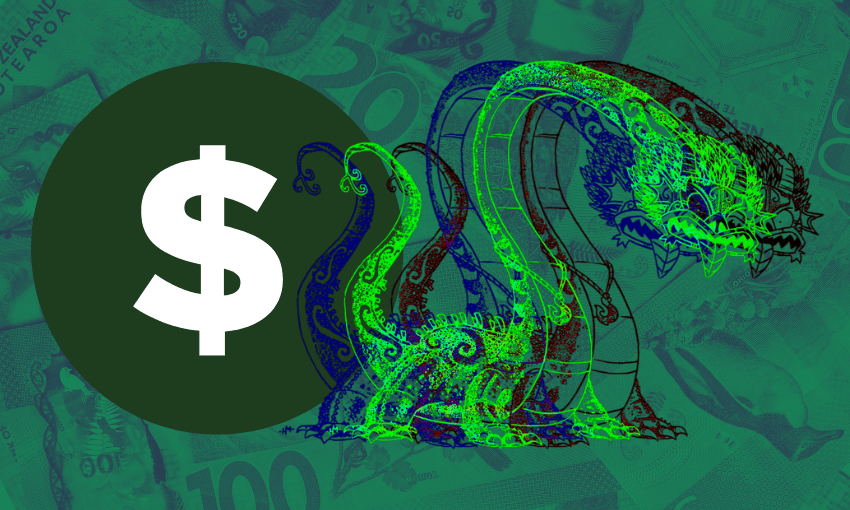Treaty of Waitangi negotiations minister Paul Goldsmith is eager to see a Ngāpuhi settlement, as are leaders from within the iwi. What’s stopping progress?
Our Waitangi 2025 coverage is possible because of the 13,000-plus Spinoff members who regularly pay to support our work. If you aren’t a member yet, now is the time to sign up.
This story previously incorrectly stated that redress would be received by Tupu Tonu, instead of the post-settlement governance entity. This has been changed below.
Earlier in the week, conservation minister Tama Potaka confirmed the Crown had shown its “commitment to settling” with Ngāpuhi by initialling the proposed transfer of Kororipo Pā near Kerikeri to Ngāti Rēhia. The return of the pā site is just a part of the ongoing government efforts to reach some type of settlement with a single Ngāpuhi entity.
In 2021, the office for Māori Crown Relations/Te Arawhiti published a supplementary analysis report where the government identified there was no mandated entity for Ngāpuhi negotiations. Te Arawhiti regional director Fern Hyett said up until 2019, the Crown had continued to recognise the mandate of Tūhoronuku, a sub-committee of Te Rūnanga-Ā-Iwi O Ngāpuhi – one mandate for all of Ngāpuhi, which was rejected by hapū.
According to its website, the Ngāpuhi Rūnanga Group, whose parent organisation is Te Rūnanga-ā-iwi ō Ngāpuhi, is a collective of four organisations that represent the interests and aspirations of more than 125,000 people who identify as Ngāpuhi. It is the mandated iwi organisation under the Māori Fisheries Act 2004. Speaking exclusively to The Spinoff, Ngāpuhi Rūnanga Group’s chair Mane Tahere said he was pro-settlement, but only if the rūnanga implemented a new representation model for the iwi. According to Tahere, the rūnanga has had “a cleanout” and is actively exploring the implementation of a new model, including potentially a whakaminenga, or confederation model.
In 2023, the government launched Tupu Tonu, or the Ngāpuhi Investment Fund, a $150 million sovereign fund that had been approved by Cabinet in 2020. Tahere said the money was initially destined for the Te Rūnanga-ā-iwi ō Ngāpuhi subsidary Ngāpuhi Asset Holding Company, but instead went to the new entity Tupu Tonu due to issues with the Tūhoronuku mandate . Following publication of this story, chair of Tupu Tonu Ben Dalton contacted The Spinoff to clarify that the money was not destined for Ngāpuhi Asset Holding Company.
Regardless, the fund was marketed as being focused on building Ngāpuhi prosperity. Tupu Tonu has two shareholding ministers, the minister for Treaty of Waitangi negotiations and the minister of finance, with each ministry having a 50% shareholding. Minister for Treaty of Waitangi negotiations Paul Goldsmith is responsible for Tupu Tonu.
Initially, it was proposed the post-settlement governance entity would be receiving:
1. a single settlement quantum amount; and
2. a single, shared package of commercial redress (of which the fund and its assets would form part); but
3. area-specific cultural redress
Shareholding ministers appoint the board to oversee the governance of Tupu Tonu. While Ngāpuhi are encouraged to apply to be directors of the fund, candidates “will be assessed primarily on their business and investment expertise”. In April last year, recently appointed public service commissioner Brian Roche was replaced as chair of the fund by Ben Dalton, chief executive of Waitangi Limited (the operating company of the Waitangi National Trust). That same month, Dalton was also appointed to the role of independent audit and risk committee chairperson of Te Rūnanga-ā-iwi ō Ngāpuhi, a role which he resigned from following the filing of the group’s audited accounts.
Lindsay Faithfull, managing director of McKay (a Northland-founded electrical company owned by his family), is deputy chair of the board. Faithfull was earlier a member of the Tai Tokerau Northland Economic Action Plan governance team and is of Ngāpuhi descent. Chartered accountant Sarah Petersen is also on the board, as is deputy chair of TVNZ Ripeka Evans and former group treasurer of the New Zealand Dairy Board Geoff Evans.
Tupu Tonu has several primary objectives related to supporting the settlement of historical Treaty of Waitangi claims of ngā hapū o Ngāpuhi, including acquiring and growing a portfolio of high-performing commercial assets for their future benefit. There’s a focus on commercial assets within Northland and distributing a portion of the profits back to Ngāpuhi hapū, whānau and uri.
According to the 2023/2024 annual report, Tupu Tonu has made progress toward its goals. The value of the fund has reached $162 million and it has achieved a 4.4% rate of return on assets. It has committed to invest $60 million in a range of whenua-based sectors, made 13 individual investments, and deployed or committed a total of $71.65 million in capital.
Tupu Tonu has invested in a solar farm development, water storage, housing developments and kiwifruit orchards. It has also been disbursing a portion of its annual returns through the Tukua scheme, distributing $630,000 to 100 Ngāpuhi hapū, whānau and uri in the 2023/24 financial year.
While Tupu Tonu has progressed its investment and disbursement activities, it is important to note that the papers that established the entity state it does not have a role in Treaty negotiations. Its success will ultimately depend on whether and on what basis the investment portfolio is treated as redress in future negotiations.
Prior to his return to parliament at the 2023 election, NZ First’s Shane Jones was quoted as calling the Tupu Tonu board “inept”. At the time, the company was reported to have already spent almost half of its $150 million budget on investments in Northland, a key part of the agreement. The agreement between the entity and the government is that the money will eventually form part of the Crown’s redress with Ngāpuhi and a duly mandated entity will resolve to purchase the fund as redress. Basically, it’s pre-settlement money to an unmandated entity representing Ngāpuhi with the potential to purchase the fund as part of redress.
“It has fallen into the hands of numpties, they lack the skill, they are not interested in strategy or transformational impact in the north. They seem to be tone-deaf and largely inept,” Jones told 1News.
Tahere acknowledged there was an “awkward triangle” that existed between the rūnanga, Tupu Tonu and the government, with hapū of Ngāpuhi also in the mix. However, he said he had a good working relationship with Tupu Tonu and was hopeful there would be co-investment in the future. With the Crown’s preference for dealing with larger groupings, Tahere believed its representatives had been hopeful the rūnanga would be that single entity. When the rūnanga said it wasn’t willing to negotiate, Tahere said the government was caught off guard.
Now, Tahere says it is important to look at the key figures within Ngāpuhi pushing for settlement and what their motives are. “They [the government] are using underhanded tactics, trying to pitch hapū against each other.”
Goldsmith, meanwhile, said to media at Waitangi yesterday; “One year ago, we said ‘look, the Crown is ready to get started and ultimately, it’s up to the hapū of Ngāpuhi to step forward and make progress’. We’ve made good progress over the past year, but I want to go faster.”
When questioned on the role Tupu Tonu would play in a potential Ngāpuhi settlement, Goldsmith said it would be “a big one”.
A Crown-appointed Ngāpuhi entity has received over $150m in pre-settlement funding, yet no group holds a clear mandate and the government’s strategy remains uncertain. While there is no clear process disclosed for determining this mandated entity, the government seems set on encouraging hapū to unify under a single mandated entity – such as Te Whakaaetanga Alliance, an alliance of several Ngāpuhi hapū based around Te Rāwhiti in the Bay of Islands. While Ngāpuhi Rūnanga Group is a significant entity representing Ngāpuhi, it is not the entity that will likely be in control of Tupu Tonu. Instead, the Crown is encouraging hapū to unite and form a single negotiating entity while retaining ultimate control over the process. Ngāpuhi Rūnanga Group, as a mandated iwi organisation, plays a crucial role in supporting the community, but the ultimate responsibility for settlement negotiations and control of the fund will likely continue to fall to different entities within the cloak of Ngāpuhi.
The government has been emphasising inclusivity but reserving the right to determine when overlapping claims are resolved. Tupu Tonu is separate from Treaty negotiations while positioning itself as a key part of the future settlement offer, balancing the Crown’s desire for a streamlined settlement with Ngāpuhi’s preference for self-determination.
This is Public Interest Journalism funded by NZ On Air.

